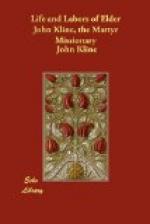MONDAY, July 31. Harvest meeting at the Flat Rock. David Kline is elected speaker.
SATURDAY, August 26. The job of building the abutments for the bridge at Coots’s is let to contract.
MONDAY, August 28. Attend the burial of Brother Solomon Garber. Age, fifty-four years, five months and twenty-nine days.
WEDNESDAY, November 1. On this day Brother Kline, in company with Joseph Miller, son of Daniel Miller near head of Linville’s Creek, started on a journey to West Virginia. They got to Jacob Warnstaff’s first day—had night meeting in Bethel meetinghouse, near by; meeting at Chlora Judy’s, on Mill Creek, next night; meeting at James Parks’s, on Looney’s Creek, the night following. I will dress up the skeleton of the sermon Brother Kline preached here, as best I can. Romans 14:7. TEXT.—“For none of us liveth to himself.”
The phrase “none of us,” as used in the text, means not one of us. I say this to give emphasis to this part of my subject.
The social element, or love for society, is deeply impressed upon all the animate world. We feel the truth of a very common saying—“birds of a feather will flock together”—every time it is repeated in our hearing. This expression, in its most comprehensive sense, applies to everything having life and volition or the power to will. It is seen in the fishes of the sea, in the birds of the air, and in all the denizens of earth, from insects and worms up to the highest forms of organic brute life, and in man. This love for society, or company, or companionship, is so strong that it is the bond of the universe. Without it nothing living could subsist. To make this thought clear to your understandings, let me just call your minds to reflect a little upon what the state of things would be in the natural world if this law of love were reversed in the brute creation. Our domestic animals, instead of feeding together in harmonious and peaceable flocks and herds, would instantly turn to fighting and seeking to destroy each other. The earth would soon be strewn with the dead bodies of beasts and birds, and the waves of the sea would




